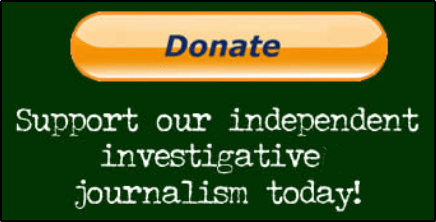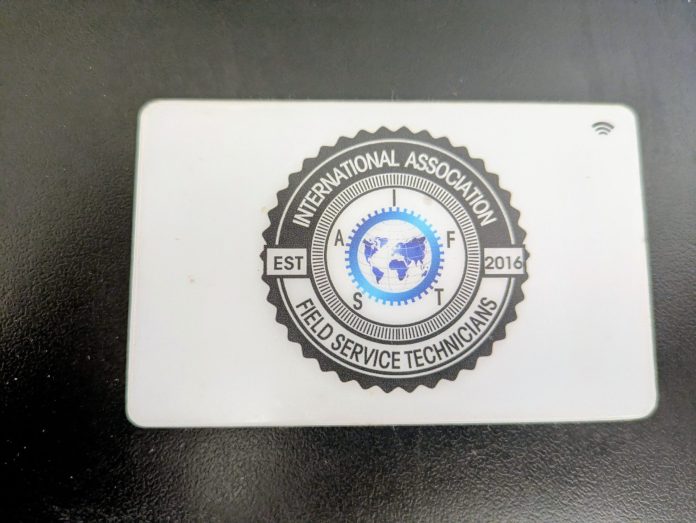What looks like a business card folded into a plastic rectangle is quietly becoming one of the most practical, low-cost identity tools in mortgage field services. For years, property preservers, inspectors, and field technicians have relied on paperwork, lanyards, and shouted names to prove legitimacy when municipal officers, residents, or law enforcement show up at a distressed property. Those methods work — sometimes — but they fail when paperwork is lost, vendor names are unfamiliar, or a nervous neighbor calls 911. The International Association of Field Service Technicians (IAFST) is deploying NTAG215 PVC cards paired to unique profile pages on the Trade Association’s website to cut through that confusion. This is not a gimmick; it is a simple technological affordance that, when properly implemented, reduces confrontations, documents presence, and protects labor by making identity and credentials instantly verifiable.
The physical mechanics are straightforward and well-understood: a NTAG215 PVC card contains a passive NFC chip and antenna and holds an NDEF URI record that points to a web address. When someone taps a modern smartphone to the card the phone’s NFC stack recognizes that NDEF URI and prompts the user to open the URL — usually in the device’s browser. The desktop writers used to program these cards log a card’s unique serial number and write a short, consistent URL to the chip, so each physical card is tied to one verified member page. Because these tags are passive, they require no battery, are inexpensive to produce in bulk, and can be carried in a wallet like any ordinary membership card. That mix of simplicity and portability is exactly why IAFST leaders chose this approach: it’s an affordance that works in the field without training sessions or apps, and it fits the rough, mobile, often improvisational work of property preservation and inspections.
For IAFST Members, the card reframes an everyday encounter. Rather than fumbling for paperwork or reciting company names, a Field Service Technician or Inspector can present a small, familiar object that anyone with a smartphone can tap. The experience is quick: within seconds a browser opens to an IAFST member page showing name, badge level, and the basic certification history the organization vouches for. That immediacy matters in tense moments — a tap replaces suspicion with verifiable facts, and facts defuse many confrontations before they escalate. Several IAFST Members told Foreclosurepedia they appreciate the dignity of a neutral verification method: it stops an interaction from being about trust and makes it, instead, a matter of record. And the company branding allows for easy identification when worn with a lanyard. That shift matters to workers who move between vendors and regions; a consistent, portable credential creates a professional throughline that a printed work order often cannot. For crews, the cards also serve as a visible sign of membership and a reminder that each person on site is part of a larger Association with standards and an accountability framework.
For residents, municipal staff, and law enforcement, the innovation is equal parts reassurance and transparency. Many people in neighborhoods where foreclosures and preservation work happen day after day have learned to be wary, and rightly so: the wrong contractor at the wrong time can create a viral incident that damages reputations on all sides. The IAFST card reduces ambiguity. A simple tap or QR scan shows a curated member page; the public sees a clear name, an issued date, the bearer’s training history, and both the Association’s seal as well as the company logo. That clarity reduces the instinct to escalate uncertain situations and instead encourages a quick verification — a small act that often prevents bigger problems. Law enforcement officers and building managers who reviewed early demonstrations told Foreclosurepedia they found the system useful because it documented presence in a way that paperwork alone did not: digital timestamps, a recorded issuance history, and the ability to contact the issuing association are all visible at a glance. In short, the card creates a shared factual reference point for the worker, the property owner, and any official on scene.
IAFST’s member pages are intentionally lean and factual, written to be immediately useful to an outsider tapping a card for the first time. Visitors see the member’s name, membership status, a concise summary of completed training modules, and a photograph taken at issuance — the essentials that answer the immediate question, “Who are you, and are you authorized to be here?” The pages are designed to avoid over-sharing: they do not publish sensitive personal identifiers or unnecessary personal data, and they present an audit trail showing when the card was issued and when the member last renewed training. Where additional documents are required — IAFST University certificates, scanned IDs, or deeper records — the site will route requests through an administrative verification channel so that sensitive documents are disclosed only where appropriate. Those design choices protect technicians while giving the public confidence; the balance is deliberate because the card is a pointer to institutional verification, not a secret credential in itself.
Privacy and trust are core to the rollout narrative IAFST is telling members and the public. From the association’s perspective, the NFC card is a transparency tool that must be governed by clear policy: what gets shown publicly, how long issuance logs are kept, and how a member can request suppression or reissue after a loss. Foreclosurepedia’s reporting emphasizes that the card itself is readable by anyone and should never be treated as a standalone security token. Instead, the value comes from the IAFST systems behind the page — the same systems that can show a revocation status or an updated training record in real time. For members worried about overexposure, the association has promised limited public data and an accessible process for removing or updating information, and it has committed to retaining issuance logs in a way that supports audits without exposing private data to casual viewers. That promise of procedural transparency is crucial: trust in the field is fragile, and policies that protect both workers and the public are what make a technical solution actually sustainable.
Accountability follows from that transparency. Unlike homemade badges or informal IDs, an association-backed card carries with it a ledger — an issuance record, a revocation history, and the potential for traceable audits when incidents occur. That traceability works both for workers and for those who oversee them: it protects technicians from false accusations by showing documented status and it protects property owners and officials by providing a verifiable chain of custody for who was on site and when. Foreclosurepedia has consistently argued that tools which both empower labor and enable accountability tend to be the most durable reforms; this card is precisely that kind of tool. It does not replace supervision or contractual obligations, but it amplifies the ability of supervisors and the public to verify claims quickly and reliably.
IAFST’s rollout is built around pilot programs and iterative learning rather than a single nationwide launch. The association is beginning with regional pilots to observe how the cards perform across different neighborhoods, jurisdictions, and device ecosystems. Those pilots are designed to surface the practical questions that rarely show up in a controlled test: how do older phones behave, what happens when a card is lost in the field, and how do members communicate the card’s purpose to a skeptical public? Measuring those outcomes will shape the association’s guidance for members, the content of the public pages, and the cadence for renewal and reissuance. Foreclosurepedia will be watching the pilot metrics closely — not just how many cards are written, but metrics that matter to safety and labor: incidents avoided, verification uses logged, and the speed with which revoked cards are recognized in the field.
The human side of technology is always the deciding factor, and IAFST’s leaders are foregrounding that reality in communications to members. The card is being introduced as a member benefit: it’s a portable credential that speaks for the technician in moments when words alone may not be enough. The association is framing the program around worker dignity and public reassurance, not surveillance or exclusion. Early member feedback has emphasized pride in having a consistent, portable identity that travels with them across jobs and vendors; that pride matters because credibility on the street is built one encounter at a time. For the public, the card is an invitation to a simple act—tap, read, and decide—rather than a demand. That low-friction exchange is the design principle that will determine whether the card becomes an everyday tool or an unused novelty.
Foreclosurepedia’s final take is pragmatic and clear: IAFST’s NFC card is a small technological nudge with outsized potential to reduce confusion, protect workers, and create a shared factual baseline for property-level interactions. It succeeds only if the association sustains transparent policies, reasonable limits on public data, and an operational backbone that can revoke and reissue reliably. The card is not a magic bullet, but it is an elegant piece of infrastructure — inexpensive, portable, and aligned with the association’s broader labor-forward mission. For members, it is a mark of professional standing; for the public, it is a quick path to reassurance. For everyone involved, it is a pragmatic way to make work on America’s distressed properties a little safer and a little more orderly.









